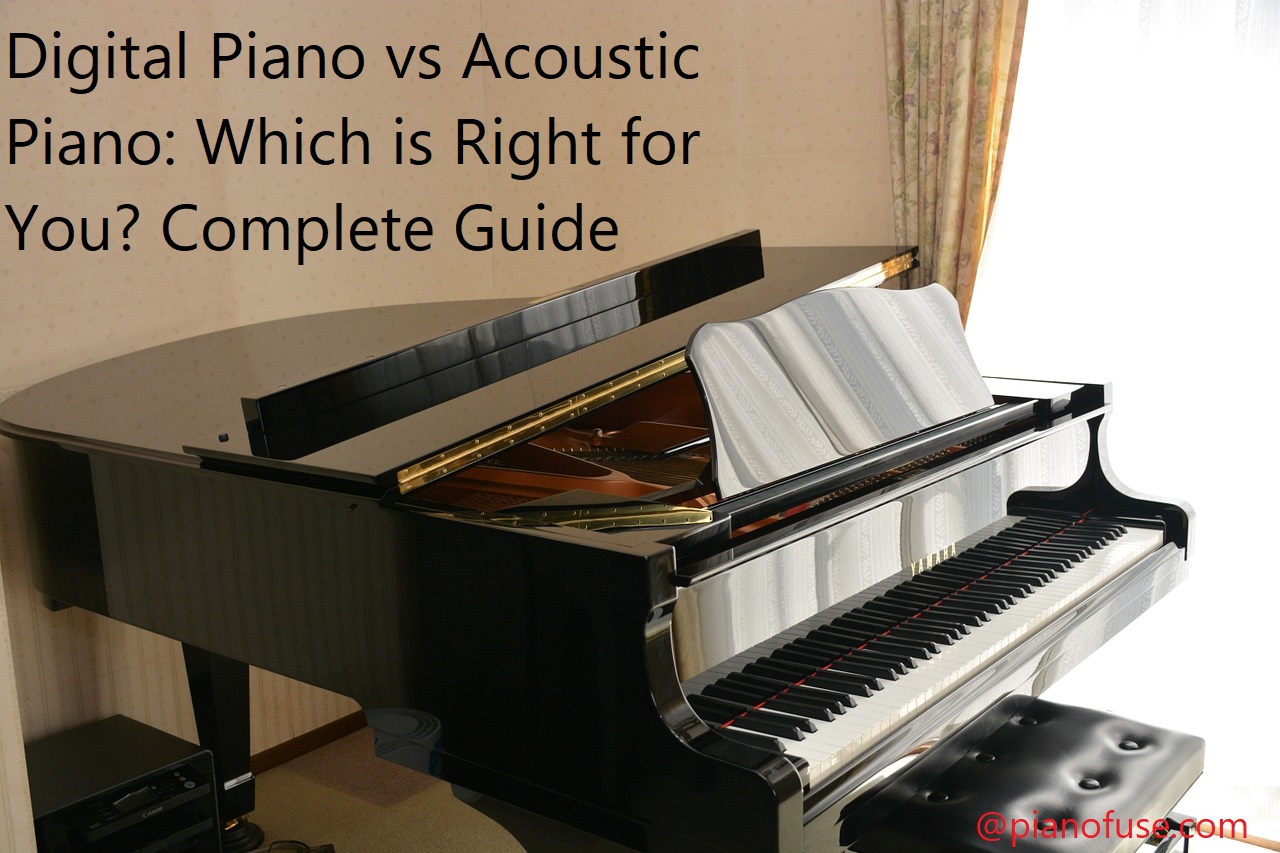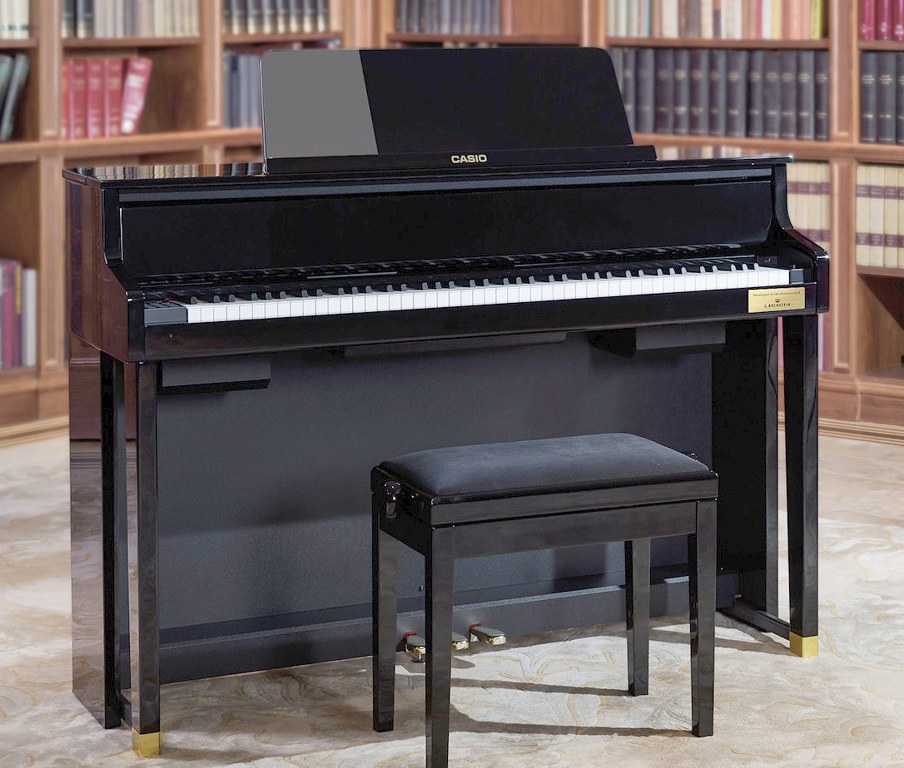Are you trying to decide beatween a digital piano and an acoustic piano? Making this choice can be challenging, but don’t worry: we’re here to help.
We’ll provide expert advice to guide you in understanding the main differences between these instruments. You’ll learn which one is right for your individual needs so you can confidently choose the perfect piano for your home.
When it comes to choosing between an acoustic piano and a digital one, there can be a lot of information to consider and it is important to understand the different features so that you can select the best option for your needs. Both types of keyboards have their own advantages and disadvantages, making them suitable for different purposes and players.
To begin with, it is important to note that while digital pianos are designed with portability in mind, they cannot provide the same level of touch sensitivity or sound quality as an acoustic piano. However, newer models do offer features such as headphone jacks, adjustable volume control and weighted keys that help replicate the playing experience of a real piano. On the other hand, acoustic pianos provide richer notes due to their larger sounding board and string design. Plus, you will never have to worry about needing electricity or batteries either- which could be a major plus if you plan on performing live or playing for extended periods of time.
In this guide we will explore the differences between digital pianos and offer some helpful tips that will assist in finding an instrument that meets your individual needs.
Explanation of the topic
When it comes to choosing a piano, there are two main categories to consider — digital and acoustic instruments. In this article we’ll look at the advantages and disadvantages of both types so you can make an informed decision about which is the best option for your own situation.
Digital pianos offer the advantage of convenience and portability; they are easy to set up and can usually be played without an amplifier or speaker system. You can also get a wide range of sounds, often tailored to whatever style of music you want to play. Many digital pianos come with features like direct USB connection and recording capabilities, as well as MIDI controller compatibility. Digital pianos can also be modified with additional buttons, pedals or sliders, which allows them to expand into more sophisticated configurations if necessary. Additionally, they may provide built-in metronomes and drum machines for practice or performance use.
On the other hand, acoustic pianos have a classic sound that many musicians prefer. It’s also commonly accepted that it takes increased skill for a performer to make expressive music on this type of instrument due to the lack of electronic processing available compared to digital models. The felt hammers hit strings inside these instruments necessary for producing every note’s full-range dynamic response – something impossible on most electronic keyboards. Plus, when acoustic instruments are maintained properly – strings tuned by professionals every so often – their value increases over time from being well-kept musical treasures which can be passed along generation after generation.

Importance of choosing the right piano
When it comes to selecting a piano, it’s important to consider the features, capabilities, and type of instrument that best suit your needs. While digital pianos offer modern features such as superior sound quality and the ability to record music, acoustic pianos may offer a sense of nostalgia and an unmatched level of control. The type of piano you choose is completely dependent on what you are looking to get out of your playing experience.
Whether you are an amateur or professional musician, there are many factors that should be considered before making a purchase. To help you make the right decision for yourself, here is a guide on the importance of choosing between an acoustic and digital piano. Both instruments have their unique advantages and disadvantages which will be discussed in greater detail below.
Digital Pianos
Digital pianos come with several advantages:
-Sound Quality: Digital pianos can emulate the sound of other instruments like drums, guitars, strings etc., allowing one to perform with varied backgrounds. Furthermore, most digital models provide great sound quality both from their internal speakers as well as through headphones or external speakers when connected via appropriate cables or wireless connections.
-Costs: Digital pianos usually cost less than acoustic models due to the fact that they contain fewer components (e.g., no strings or hammers). Additionally, they require little maintenance costs since no tuning or repair work is necessary on these instruments unless software issues arise which can generally be resolved without replacing any parts.
-Durability: As electronic devices rather than mechanical instruments like traditional acoustic pianos, digital models are more resistant to wear and tear over time due to fewer moving parts within them; thus digital models can generally last longer even with frequent use over extended periods compared to acoustic versions that require regular maintenance such as tuning and repairs of broken hammers/strings in order to operate effectively again after prolonged use over time.
Acoustic Pianos
– Authenticity: Acoustic pianos have more complex sound production compared to digital versions due mainly because their mechanics provide less emphasis on synthetic sounds created through technology instead opting for organic sounds produced by real hammers striking metal strings within them; thus producing higher authenticity not achievable by electronic counterparts even if modern technology allows for greater accuracy in key pressure sensitivity detection for dynamic music producing capabilities coupled with superior sound quality either from an integrated speaker system installed inside them (though this is rare) or through external audio systems such as surround audio headphones/speakers when using shorter cables or wireless connections (depending on manufacturer specs).
 Digital Piano
Digital Piano
The relative newcomer to the piano family is digital pianos. These electronic instruments mimic many of the features and tones of acoustic pianos closely enough that most players can’t easily distinguish between them. Depending on the model and level of sophistication, digital pianos can come with a range of features, from simple one-keyboard instruments for beginners to full-blown arranger keyboards with a variety of sounds, styles and sequencing capability.
Digital pianos offer a wide range of advantages over acoustic models:
- Digital pianos are generally much lighter in weight and more compact than an acoustic piano, making them easier to transport.
- They quickly switch between different voices (piano sounds) at the touch of a button, something that could only be accomplished in acoustic models via an expensive rebuild or by purchasing multiple instruments.
- They tend to be much more affordable than their acoustic counterparts, as digital technology has become increasingly sophisticated while dropping in cost. Additionally, they usually carry manufacturers’ warranties with money-back guarantees if dissatisfied customers return them within a particular timeframe.
- Digital pianos often include instructional/play-along toolkits like rhythm tracks and tempo settings as well headphone jacks for private practice.
- Many modern digital keyboards have midi capabilities for computers and recording systems which enable users to record tracks on their computer for playback or studio production projects.
Definition and explanation of a digital piano
A digital piano is an electronic musical instrument designed to simulate the sound of a traditional acoustic piano. Unlike acoustic pianos, digital pianos produce sound from an onboard speaker or headphone port and don’t require any physical action or reaction from a player, either in the form of striking keys or activating pedals. Digital pianos may also have additional features like built-in metronomes, effects and recording options.
Digital keyboards differ from digital pianos in that they usually feature keys that aren’t full size; have fewer than 88 weighted keys; don’t typically contain hammer action; and usually offer additional features such as on-board rhythm accompaniments and sounds other than just grand piano. However, some digital keyboards can emulate the tone and playability of a real acoustic piano.
The main advantages of a digital piano are its versatility, convenience, portability and price. They are also easier to maintain than traditional acoustic models with fewer parts that require tuning or repairs, making them more accessible for first-time players than their acoustic counterparts. Additionally, the lack of need for external amplification (or any at all for certain models/brands) makes them perfect for silent practice at home or on the go with headphones/earbuds.
Advantages of a digital piano
A digital piano tends to be the preferred choice for people looking for a modern, convenient, and cost-effective way to get into the world of music. Not only are digital pianos easier to learn and play than acoustic pianos but they also offer more features and flexibility. Particularly for beginners, here are some of the key advantages of having a digital piano.
Costs: Because digital pianos do not require you to have any physical presence in the same way that an acoustic piano does, they can often be much cheaper (not just initially, but over time too due to lower maintenance costs).
Space: Unlike many acoustic pianos that need lots of space with room so sound can resonate naturally (notably upright models), digital pianos are typically much smaller in size, meaning they don’t require as much space in your home or studio.
Portability: Digital pianos come with robust hinges on their sides that make them easy to be transported back and forth between places—great if you’re regularly attending classes or studying at home as part of coursework.
Features/Customization: Digital pianos tend to come outfitted with more features than most people want or need if going for an acoustic instrument. That increases music production options exponentially, such as creating various soundscapes from myriad tonal shades brought on by changes in reverberation intensity, recording capabilities etc while also making it easier for students new to music technology to become proficient fast – something which may take years if starting with a traditional instrument alone.
Disadvantages of a digital piano
The key disadvantage of digital pianos is that, although they can often produce great sounds, they cannot reproduce the full range of the acoustic piano. This means that if you want the full sonorous sound of a real piano, then you will need to go for an acoustic version.
Another disadvantage is that digital pianos are not as sensitive as acoustic models and may require a heavier touch when compared to traditional types. If you have trained with an acoustic model in the past, it can be difficult to adjust to a digital alternative. Additionally, mechanical noise produced by sound controllers and pedals are often experienced on digital models – something which can be quite distracting whilst playing.
Digital pianos also require electricity in order to work properly and having access to an outlet may not always be possible. Some portable versions of these models operate on batteries but these need recharging on a regular basis – something which should also be factored into your purchase decision.
Types of digital pianos
Digital pianos come in two primary types — fully weighted and semi-weighted. Fully-weighted digital pianos provide a more realistic playing experience. The keys are heavier, similar to an acoustic piano. This makes them ideal for learning repertoire and getting used to the resistance of an acoustic instrument. Semi-weighted digital pianos have lighter keys and often are less expensive than their fully-weighted counterparts. They’re a great option for the beginner or intermediate player who is just learning the basics of playing the piano.
In addition, some digital pianos have extra sounds that can be used to create a more verstile sound palette or layer on top of accompaniment parts to increase their complexity. Some also respond to different touch sensitivities and will make certain notes louder based on how hard they’re pressed. All of these features add color and interest to your compositions, as well as depth and texture when you’re playing live gigs with friends or performing in bands or orchestras.
Factors to consider when choosing a digital piano
When you’re making the decision of whether to purchase a digital or an acoustic piano, there are several factors you should consider. It’s important to understand your personal goals, preferences, and budget when selecting either a digital or acoustic piano.
Some of the key considerations include:
- Your musical goals – Do you intend to study for exams, learn for leisure or explore other genres of music?
- Size and weight – Digital pianos tend to be lighter, smaller and more portable than acoustic pianos which can be bulky and heavy. If portability is a priority for you then digital pianos are better suited due to their size.
- Cost – Acoustic pianos can often come at a greater cost than digital pianos depending on the make and model selected.
- Number of features – Digital pianos tend to offer more features such as pitch control, sustain pedal control and recording capabilities than traditional acoustic models. They may also provide access to different types of sound samples too so it pays off to compare different models first and determine which features are essential for your needs before making any purchase decisions.

Conclusion
Choosing between a digital piano and an acoustic piano is a personal decision. While both have their strengths, which type of instrument you purchase will ultimately come down to your own preferences and needs.
If you are a beginner who wants to save some money, then the digital piano may be the best option for you. On the other hand, if money isn’t an obstacle and you want to invest in something of top quality, then an acoustic piano might be the way to go.
No matter which type of instrument you choose, keep in mind that how much time and effort you put into learning and practicing it is probably more important than what type of piano you are playing. Whichever decision you make, have fun with it!
FAQ’S
Which is better digital or acoustic piano?
Both digital and acoustic pianos have their advantages and disadvantages. Acoustic pianos provide an authentic playing experience and sound, while digital pianos are more versatile, affordable, and require less maintenance.
Is a digital piano as good as a real piano?
Digital pianos can come very close to replicating the sound and feel of a real piano, but they may not be able to fully replicate the nuances of an acoustic piano.
Should I get an upright piano or digital piano?
The choice between an upright piano and a digital piano depends on personal preference and needs. Upright pianos provide an authentic playing experience and sound, but are more expensive and require more maintenance. Digital pianos are more versatile, affordable, and require less maintenance, but may not provide the same playing experience as an acoustic piano.
Which piano is best for learners?
The best piano for learners depends on personal preference and needs. Both acoustic and digital pianos can be good for learners, but digital pianos may be more practical for beginners due to their affordability and versatility.
What are the disadvantages of digital piano?
Some disadvantages of digital pianos include a lack of authenticity in sound and feel, reliance on technology, and difficulty replicating the nuances of an acoustic piano.
Are acoustic pianos good for beginners?
Acoustic pianos can be good for beginners, as they provide an authentic and tactile playing experience. However, they may be more expensive and require more maintenance than digital pianos.
Is digital piano good for beginners?
Digital pianos can be good for beginners, as they are affordable, versatile, and require less maintenance than acoustic pianos. They can also provide a range of features that can aid in learning.
How long will a digital piano last? The lifespan of a digital piano depends on the quality of the instrument, the frequency of use, and the care taken to maintain it. On average, a well-maintained digital piano can last for 10-20 years or more.
Why choose digital piano?
Digital pianos are a good choice for those who want an affordable, versatile, and low-maintenance instrument that can provide a range of features and sound options. They are also portable and can be used with headphones for quiet practice.
Which digital piano is closest to real piano?
There are several digital pianos that are known for their authentic sound and feel, including models from Yamaha, Kawai, and Roland. The choice between them depends on personal preference and needs.
See Also:
- Best piano mic 2023
- Best portable digital piano 2023
- Best portable piano keyboards 2023
- Best upright piano 2023
- Best yamaha digital piano 2023


